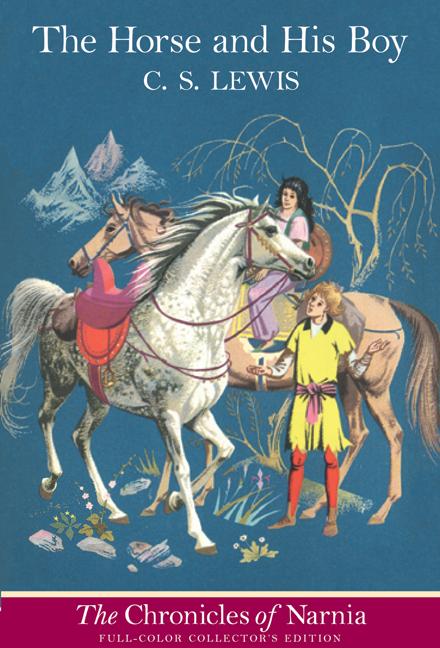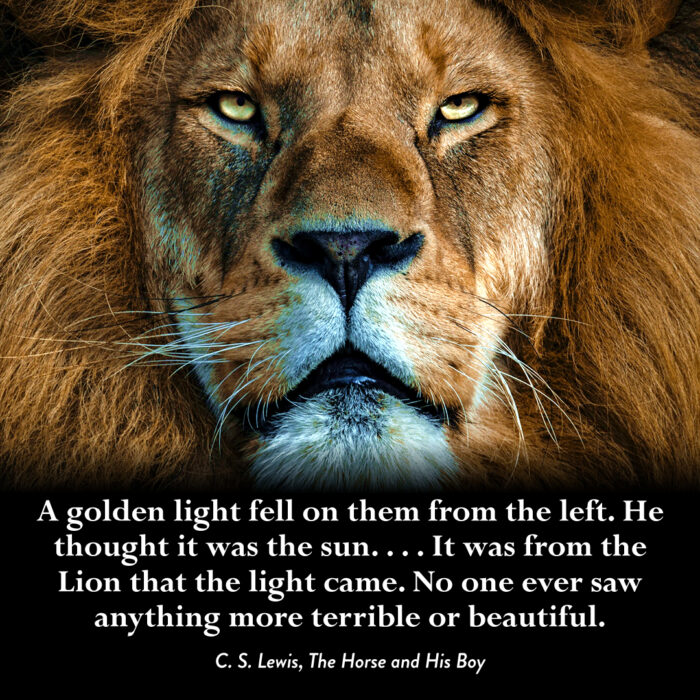Shasta’s Meeting with Aslan in The Horse and His Boy Helped Me Embrace God’s Sovereignty
The Horse and His Boy is my favorite Narnia book. I say this as a reader who has loved this series for more than two decades. It’s often difficult for Narnia fans to choose a favorite chronicle, but for me this has always been my favorite.
Many other fans emphasize The Horse and His Boy’s sense of longing in Shasta’s life. He desires something beyond our earthly experience, the home we’ve never known. This is certainly a theme in Lewis’s fiction, especially in his Narniad1 and in his Till We Have Faces. But Shasta’s sense that he does not belong in Calormen never captivated me like his encounter with Aslan.
 Shasta’s mountaintop experience
Shasta’s mountaintop experience
Shasta has made it to the end of his hours-long race to bring the news of Rabadash’s treachery to King Lune of Archenland and his Narnian allies. But the young runaway is untrained in horsemanship (except for his talking horse’s instructions for their journey north). So he falls behind the Archenlanders and is separated from them by fog on the mountains. Lost and confused, he begins to believe the worst, calling himself “the most unfortunate boy that ever lived.”2
Eventually, Shasta realizes he is not alone. He recounts all his (mis)adventures to his unwelcome fellow traveler, who says, “I do not call you unfortunate.”
The Voice then explains how He has been at the back of Shasta’s story from the beginning, guarding and guiding him so that Shasta could save Narnia and Archenland at this moment. “There was only one lion. . . . I was the lion.”3 The Voice goes on to say,
“I was the lion who forced you to join with Aravis. I was the cat who comforted you among the houses of the dead. I was the lion who drove the jackals from you while you slept. I was the lion who gave the Horses the new strength of fear for the last mile so that you should reach King Lune in time. And I was the lion you do not remember who pushed the boat in which you lay, a child near death, so that it came to shore where a man sat, wakeful at midnight, to receive you.”4
A beautiful and terrible truth
I can remember the first time I read this scene, and felt confusion about the truth that Aslan harmed someone. But I also felt certain he had been right to do so. And I knew the beauty and terror of how intimately Aslan had been involved in Shasta’s life—yes, as protector and comforter, but also as one source of pain and trouble.
How could I reconcile these varied thoughts and emotions?
More from this series
- In Sixth Grade, I Learned the Secret Meaning Behind ‘The Lion, the Witch and the Wardrobe’
- I Love Beholding the Old Stories Coming True in ‘Prince Caspian’
- Joining Lewis’s ‘Voyage of the Dawn Treader’ Taught Me How to Sail for Aslan’s Country
- Jill’s and Eustace’s Journey to ‘The Silver Chair’ Taught Me Faith and Obedience
A golden light fell on them from the left. [Shasta] thought it was the sun. . . . It was from the Lion that the light came. No one ever saw anything more terrible or beautiful.5
As I’ve grown older, I have especially loved two of Aslan’s “I was” statements in this scene. Aslan tells Shasta that he was both the cat who comforted and the lion who drove away the jackals. Anyone who has read this story knows the terror Shasta felt sleeping among the tombs of the ancient kings outside Tashbaan. Because of my childhood fear of the dark and what might be lurking out there, I needed little imagination to picture this scene. Shasta’s terror was also my own. Even today, when I face uncertain times and dark places, I find precious hope in Aslan’s comfort and defense from terror.
‘I was the lion you do not remember’
Aslan also demonstrates that he influenced Shasta’s life even earlier. On the night Shasta was stolen from his family, Aslan ensured Shasta’s survival. He also placed Shasta in the one home where, years later, he could meet Bree and begin a journey that would allow him to meet Aravis and undertake an adventure to save Narnia.
Of course, Shasta’s assurance of divine intervention does not erase the sorrows he also knew. But Aslan’s revelation does give him a perspective that few of us receive in this life, but can expect to hear in the New Heavens and New Earth when God wipes away every tear.6 We may struggle to embrace this truth in our fallen world. But it’s more than an encouraging thought to remember that the True Aslan is “at the back of all the stories,”7 even our own.
- Many fans refer to Lewis’s seven-volume The Chronicles of Narnia series as the Narniad. ↩
- Sarah Sparks interprets this scene in a powerful way in https://www.youtube.com/watch?v=lkSbRzYNXSs ↩
- The Horse and His Boy, chapter 11. ↩
- Ibid. ↩
- Ibid. ↩
- Revelation 21:4. ↩
- Shasta describes Aslan with this phrase in The Horse and His Boy chapter 14. ↩





























This is my favorite book in the series. It has always stuck with me, about Aslan hurting Aravis to show her what her maid suffered from. I’m not sure if I agree with the sense of God actually hurting people or maybe He allows things to happen. But it’s always been an interesting and thought-provoking concept.
Thank you for this, Elijah. I also will never be too old for Narnia. 🙂 I love this section in the Horse and His Boy, too. It’s given me the same assurance as you point out here. Even when we can’t see Him, He is there.
The horse and his boy is my favorite Narnia book. I read it many times. The part in the story that you talked about comforts and encourages me